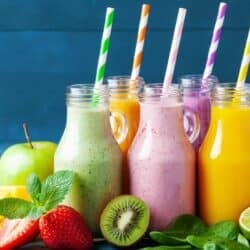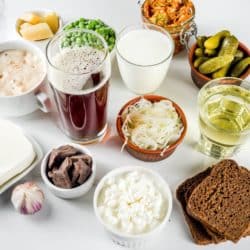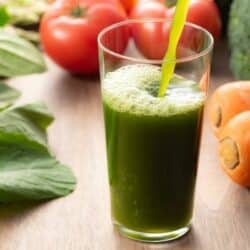10 Nutrients for Gut Health (Which Foods to Eat)
Taking care of your gut health is crucial for overall well-being, and certain vitamins can plan an important role in supporting your digestive system. From vitamin A to zinc, here are some nutrients and vitamins for gut health and the foods you can eat to get them.

Overview of Gut Health
The term “gut health” refers to the condition of our gastrointestinal tract. These are all the organs through which foods and liquids pass when we eat, digest, absorb, and eventually excrete them.
A healthy gut depends on the balance of the microbiome – the trillions of bacteria that inhabit it.
When the gut contains the correct balance and diversity of these bacteria and microorganisms, we are able to digest the foods we eat effectively.
A healthy gut is also important for our general well-being, both physically and emotionally.
In order to maintain optimal gut health, we need to consume a diet rich in fresh, healthy foods and avoid processed foods, or those with added sugars.
Potential Gut Health Issues
When your gut is in poor shape, a number of problems can develop.
As you might expect, many of these are related to digestion, so you might experience discomforts like heartburn, gas, bloating, diarrhea, and constipation.
You may also have trouble absorbing nutrients from the foods that you eat, possibly leading to weight loss. Or your blood sugar levels could be affected, contributing to weight gain.
But not all issues relating to an unhealthy gut are connected to digestion. Poor gut health can also impact our immune system, potentially leading to autoimmune disorders and increased inflammation.
It can cause skin irritation, with studies suggesting that conditions like eczema are caused by “leaky gut syndrome”. This is a problem where a damaged intestinal wall allows bacteria and other toxins into the bloodstream.
Poor gut health can affect brain function, too, and has been associated with mood regulation and depression.
Addressing Gut Health Naturally
The good news is that – in many cases – your gut health is under your control and there are simple, natural steps you can take to make improvements.
- Avoid consuming too many processed animal proteins and foods high in sugar, salt, and saturated fats. Concentrate instead on antioxidant-rich fresh fruits and vegetables, along with foods containing plant proteins, omega-3 fatty acids, and complex carbohydrates.
- Eat foods containing prebiotic fiber, which helps feed the “good” bacteria in your gut. Sources include mushrooms, oats, barley, dandelion greens, garlic, onions, asparagus, and bananas.
- Be sure to consume probiotic foods, containing live organisms that help restore a healthy balance of gut bacteria. These include yogurt, kefir, pickles, sauerkraut, and kimchi. See my list of foods with natural probiotics.
- Try different techniques to manage your stress levels.
- Exercise regularly, in a way that you enjoy. This will help keep stress under control and may also help improve the quality of your sleep – another key factor in maintaining a healthy gut.
Nutrients & Vitamins for Gut Health
Rather than just recommending a bunch of vitamin supplements, here is information about the specific nutrients that you can prioritize for gut health, plus which foods to focus on.
Remember to always speak to your healthcare provider as you may also need to take vitamin supplements to ensure you reach adequate levels of each one. In many cases, a blood test can confirm whether you are getting enough of the various nutrients and vitamins.
1. Vitamin D

Vitamin D is probably best known for its ability to maintain strong bones. But it’s very important for the health of your gut, too!
Studies have demonstrated that it can influence the balance of “good” bacteria in the intestines.
It also helps support the immune system, protecting against infection and autoimmune disorders like inflammatory bowel disease.
It can help prevent inflammation – another problem linked to conditions like Crohn’s disease and ulcerative colitis – and also plays a key role in maintaining the integrity of the intestinal barrier. This is important, as it stops bacteria and other toxins from entering the bloodstream.
Vitamin D is often referred to as “the sunshine vitamin” because your body is able to make its own following exposure to the sun’s rays. In fact, sunlight is the best source of vitamin D available.
There are also certain foods that provide vitamin D. These include:
- Fatty fish, like salmon, mackerel, sardines, and trout
- Mushrooms (with some brands having their vitamin D content boosted by UV lights)
- Egg yolks
- Fortified foods like yogurt, orange juice, cereals, and milk
Some people, however, struggle to get enough vitamin D, particularly if they have certain medical conditions, or live in areas where it’s difficult to get enough direct sun exposure.
In these cases, vitamin D supplements are often recommended.
2. Vitamin B12
Vitamin B12 plays an important role in the formation of DNA and red blood cells.
Also known as cobalamin, it is needed by more than 80% of the bacteria in the gut in order to carry out their metabolic reactions. It may also help prevent inflammation in the colon, although there is no conclusive scientific evidence supporting this.
Good sources of vitamin B12 include foods of animal origin, like meat, fish, poultry, eggs, and dairy products.
If you’re following a vegetarian or vegan diet, you can also get vitamin B12 from fortified breakfast cereals and fortified nutritional yeasts.
3. Vitamin C
Vitamin C – also known as ascorbic acid – is a powerful antioxidant that supports your gut health in many different ways.
Research has shown that it is essential for maintaining the balance and diversity of the microbiome.
This study, meanwhile, found that the changes brought about by high-dose vitamin C supplementation had anti-inflammatory effects.
This makes it useful in preventing conditions caused by an imbalance of gut bacteria, such as inflammatory bowel disease, metabolic conditions, and even cardiovascular and neurological disorders.
It can be useful for preventing constipation, too, with vitamin C-rich fruits like kiwi fruit found to be even better than prunes for improving stool consistency and reducing bloating, with fewer adverse effects.
It helps optimize the immune system – another factor in reducing inflammation – and experts have found that it can improve your gut barrier function, too.
This helps your body absorb nutrients more effectively and ensures that you are protected from certain toxins.
You can find vitamin C in fresh fruits and vegetables. The very best sources are:
- Kiwi fruit
- Citrus fruits (oranges, grapefruits, lemons, etc)
- Strawberries
- Mango
- Pineapple
- Tomatoes
- Bell peppers
- Kale
- Broccoli
- Brussels Sprouts
4. Vitamin A
Vitamin A helps maintain the lining of the gastrointestinal tract, aiding digestion and helping us absorb nutrients from foods more effectively.
It also plays an important role in regulating the immune system, helping prevent autoimmune conditions like ulcerative colitis and Crohn’s disease.
Indeed, people with gastrointestinal conditions are vulnerable to becoming deficient in vitamin A.
For example, researchers discovered that people with Crohn’s disease are often lacking this important nutrient.
This deficiency has been found to worsen the imbalance between the formation and destruction of free radicals in the mucus lining the intestines of Crohn’s sufferers. Free radicals are unstable atoms that can damage cells.
There are two ways of getting more vitamin A into your diet.
One is to consume foods rich in beta-carotene because our bodies then convert this nutrient into vitamin A.
Good sources of beta-carotene include:
- Green, leafy vegetables like kale and spinach
- Red and yellow vegetables like carrots, sweet potatoes, and red peppers
- Yellow fruits like papaya, mango, and apricots.
You can also get vitamin A (retinol) directly from:
- Liver
- Dairy products like milk, yogurt, and cheese
- Eggs
- Oily fish
5. Vitamin E
Vitamin E is a valuable antioxidant. This means it can protect against damage to the cells in the intestinal wall, promoting effective digestion and absorption, while preventing toxins from getting into the bloodstream.
It also has anti-inflammatory properties, making it useful for protecting against inflammatory bowel conditions like ulcerative colitis and Crohn’s disease.
It helps strengthen the immune system, too, protecting against infection.
The best source of vitamin E is wheat germ, which can be added to foods or taken as a supplement.
But there are lots of other foods you can enjoy to keep your vitamin E levels up!
These include liver, eggs, nuts, seeds, cold-pressed oils, dark green leafy vegetables, and cereal grains.
6. Vitamin K

Vitamin K is probably best known for its role in blood clotting, so you might be surprised to discover that it’s good for your gut health, too!
In this study, researchers confirmed that it maintains the health of your gut by preventing inflammation, promoting a healthy balance of bacteria, and enhancing the function of the cells in the gastrointestinal lining.
The main sources of vitamin K are green leafy vegetables like broccoli and spinach, along with vegetable oils and cereal grains. It is present in meat and dairy foods, too, though in smaller amounts.
7. Vitamin B6
Vitamin B6 – also known as pyridoxine – is a water-soluble vitamin and one of the most important molecules in the cells of living organisms.
It plays an essential role in a wide range of functions in the body that regulate the metabolism of cells, so it is key to our general good health.
It has a direct impact on the microbiome, with experts finding that a deficiency in vitamin D can lead to an imbalance of gut bacteria.
It can be helpful to the gut by improving your sleep quality, too.
This is because it is involved in the production of neurotransmitters like serotonin, which help regulate your mood and may prevent disordered sleep patterns.
Fortunately, vitamin B6 is available in a wide variety of foods, so it’s usually easy to obtain all you need through your diet.
The best sources include fish, beef, tofu, eggs, dairy products, and a range of fresh fruits and vegetables.
8. Folate (vitamin B9)
Folate – or vitamin B9 – is a nutrient that occurs naturally in foods. You may also have heard of folic acid, which is a synthetic form of folate. This is usually found in supplements, or added to foods to fortify them, and is better absorbed than natural folate.
It’s a water-soluble nutrient, which means that your body can’t store it. If you consume more than you need, your body excretes it in your urine. For that reason, it’s important to regularly consume folate through foods or supplements.
It has a wide variety of roles in the body, working with other nutrients to break down and use proteins, and helping with the growth and function of cells. This makes it useful in maintaining the integrity of the gut lining and assisting with digestion and absorption.
There is also evidence that it may be helpful in treating autoimmune conditions.
Dark green leafy vegetables, legumes, sunflower seeds, fresh fruits, whole grains, and liver are all great sources of folate.
9. Niacin (vitamin B3)
Niacin – a water-soluble B vitamin – has some useful, protective effects on your gut!
A study on piglets showed that it can improve the abundance of “good” bacteria in the colon and reduce inflammation. This helps guard against inflammatory bowel diseases like ulcerative colitis and Crohn’s disease.
It’s also good for digestion because it helps break nutrients like carbohydrates and fats down into energy that we can use. Plus it has antioxidant effects, protecting gut cells from damage.
Fortunately, niacin exists naturally in so many foods that deficiency is quite rare.
To ensure you’re getting enough, your diet should contain red meat, poultry, fish, brown rice, nuts, seeds, legumes, and fortified bread or cereals.
10. Riboflavin (vitamin B2)
Riboflavin is another water-soluble vitamin that the body cannot store and that needs to be obtained from the diet on a regular basis.
It has been shown to be helpful for people suffering from inflammatory bowel disease. Studies have also shown that it can directly stabilize the balance of bacteria in the gut.
Like niacin, riboflavin plays an important part in metabolizing nutrients so that our bodies can use them. And it also functions as an antioxidant, protecting the gut lining from damage.
You can get riboflavin from a variety of sources, especially organ meats, lean meats, milk, and eggs.
In the USA and many other countries, you can also get it from fortified cereals and grains.
FAQs
A varied and balanced diet – rich in fresh, nutritious ingredients – should be enough to provide all the vitamins you need for good health. But, there are some occasions where supplements can be useful.
For example, pregnant women are often prescribed supplementary folic acid, and people who live in areas lacking natural sunlight are often advised to take vitamin D.
It’s important to remember, though, that vitamin supplements may not be suitable for everyone, especially in high doses. For that reason, it’s a good idea to check with your healthcare provider before taking them.
More Helpful Resources on Gut Health
Conclusions
The health of your gut is incredibly important, not just for efficient digestion but also for your general well-being. When your gut is in optimal condition, your energy levels remain consistent, you experience only normal levels of bloating or gas, and your mental clarity is improved. Ensuring that your diet contains all the vitamins listed here is a safe and natural way to improve your digestive health and protect yourself against intestinal discomforts.
Don’t forget to join my newsletter list to get exclusive clean eating recipes and tips. The newsletter is 100% free with no spam; unsubscribe anytime.
About the Author: Carrie Forrest has a master’s degree in public health with a specialty in nutrition and is studying to be a holistic nutritionist. She is a top wellness and food blogger with over 5 million annual visitors to her site. Carrie has an incredible story of recovery from chronic illness and is passionate about helping other women transform their health. Send her a message through her contact form.
Note: this post is for informational purposes only and is not intended as medical advice. Please consult your healthcare provider for recommendations related to your individual situation.




















